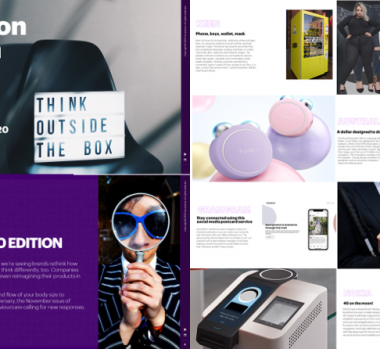Asking ‘What If’: What’s In a Name?
Matt Kingdon and Dave Allan, co-founders of the innovation company ?What If!, take a look at the power and consequence of their company’s name.
When we chose our name it felt good. ‘What If’ felt expansive, it felt optimistic and the more we spoke it out loud the more we felt affection for it. Instinctively we knew we had a good name.
That was the easy bit. Then, over 25 years we found out what it really means to earn your living asking ‘what if?’
Asking ‘what if?’ demands that you look beyond current assets, beyond the way things work now, and dream a little. We’ve all asked the question at work as well as at home; ‘What if we became a service organization?’ or ‘What if we took a year out and travelled the world?’ Effectively you are asking ‘What if some of the things we assume to be fixed are in fact variable?’ It’s exciting and stimulating and nothing new happens without asking this question. It’s that important.
But with power comes responsibility. If you ask this question of your organization in a serious way, soon you’ll find that answering it is not so straightforward.
Here is a brief user guide to asking the question ‘What if?’.
- Pub simple.
It’s all too easy to make things at work complicated. Somehow asking ‘what if we could half the time it takes to see a doctor in the emergency room?’ morphs into ‘what if we could optimize emergency healthcare customer journeys through effective knowledge hand offs?’ Suddenly a simple and audacious challenge is taken to a meaningless level of abstraction. Asking ‘what if?’ has to be so simple we can repeat it to our mates in a noisy pub. - Team sport.
Asking ‘what if?’ rarely happens in a vacuum. You normally seek the answer from people who you work with, who might be part of the ‘way things are’ or the world of ‘what is’. This needs careful handling. You don’t ask the factory manager ‘what if we were an online business?’ lightly. We’ve found asking ‘what if’ to be both a hard-nosed and tender question — you can only embark on a ‘what if…’ journey if you signal why you are asking the question, explain you’re seeking hypotheses not decisions, and that the opinion of others is genuinely valued. - Courage in the dark.
The innovation process is challenging and often lonely. Sometimes it can feel as though you’re the only one asking ‘what if’, while your colleagues are caught up in ‘what is’. The only way to stick at this journey is to be crystal clear about why you are doing it in the first place. We have found that the problem to be solved needs to be articulated in a crisp clear way that builds the resolve of corporate innovators. In the middle of the night, when you can’t sleep, you need to be confident that if you can solve this challenge then you are doing something really good in the world. - So what?
The question ‘what if?’ is a launch pad. It’s highly expansive in nature — but there’s nothing more frustrating at work than inappropriate expansiveness. How many times have we been trying to nail down an action in a meeting, only to be derailed by the eager beaver trying to open things up? We’ve only become great at asking ‘what if?’ because we’ve had to get great at asking ‘so what?’, and in short order. Without the ability to create a commercial case for action, to pull together an implementation pathway, or to have a nose for corporate politics, asking ‘what if?’ will flounder.
So there’s a lot in a name. To signify this we added punctuation —
?What If! The journey starts with a question, but it has to end with emphatic and
exclamatory action.



